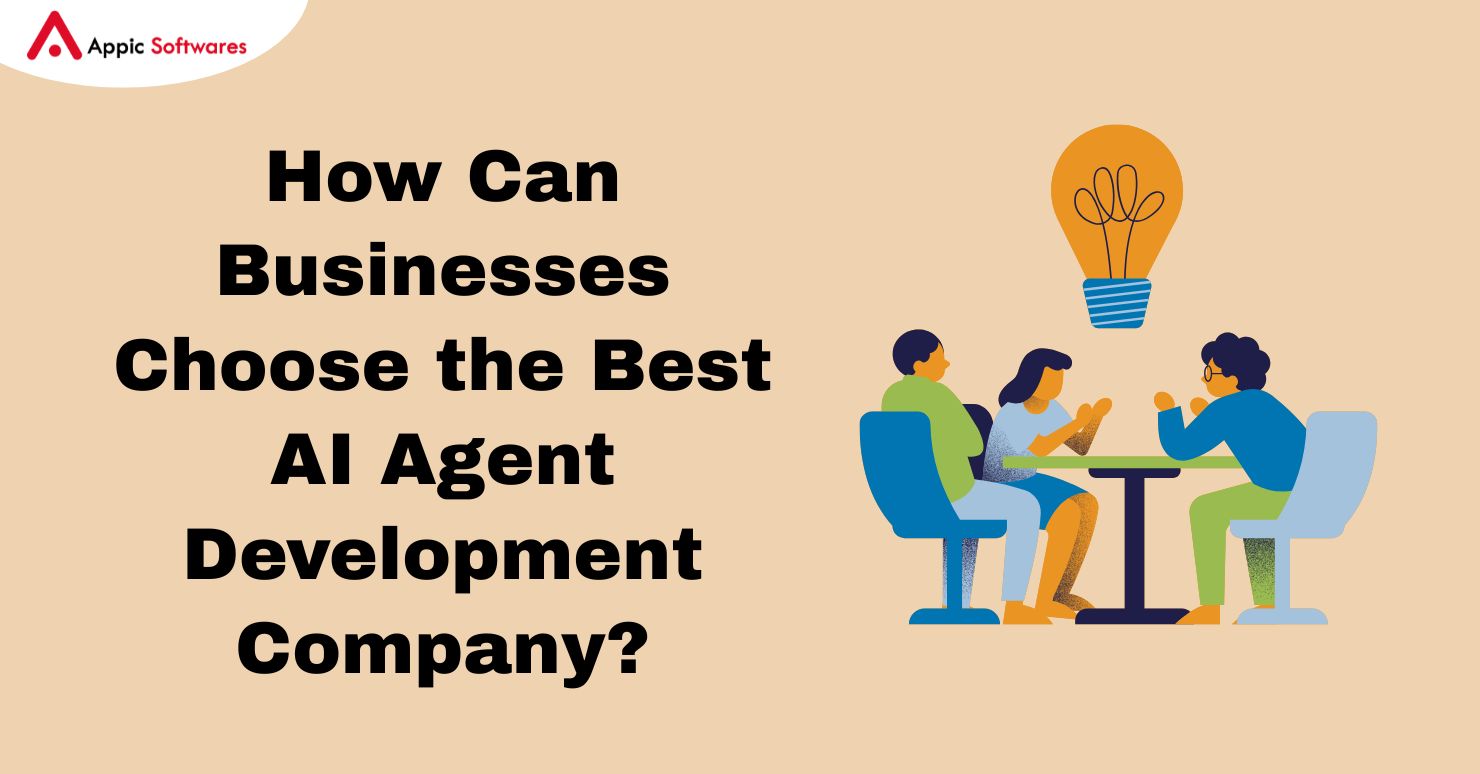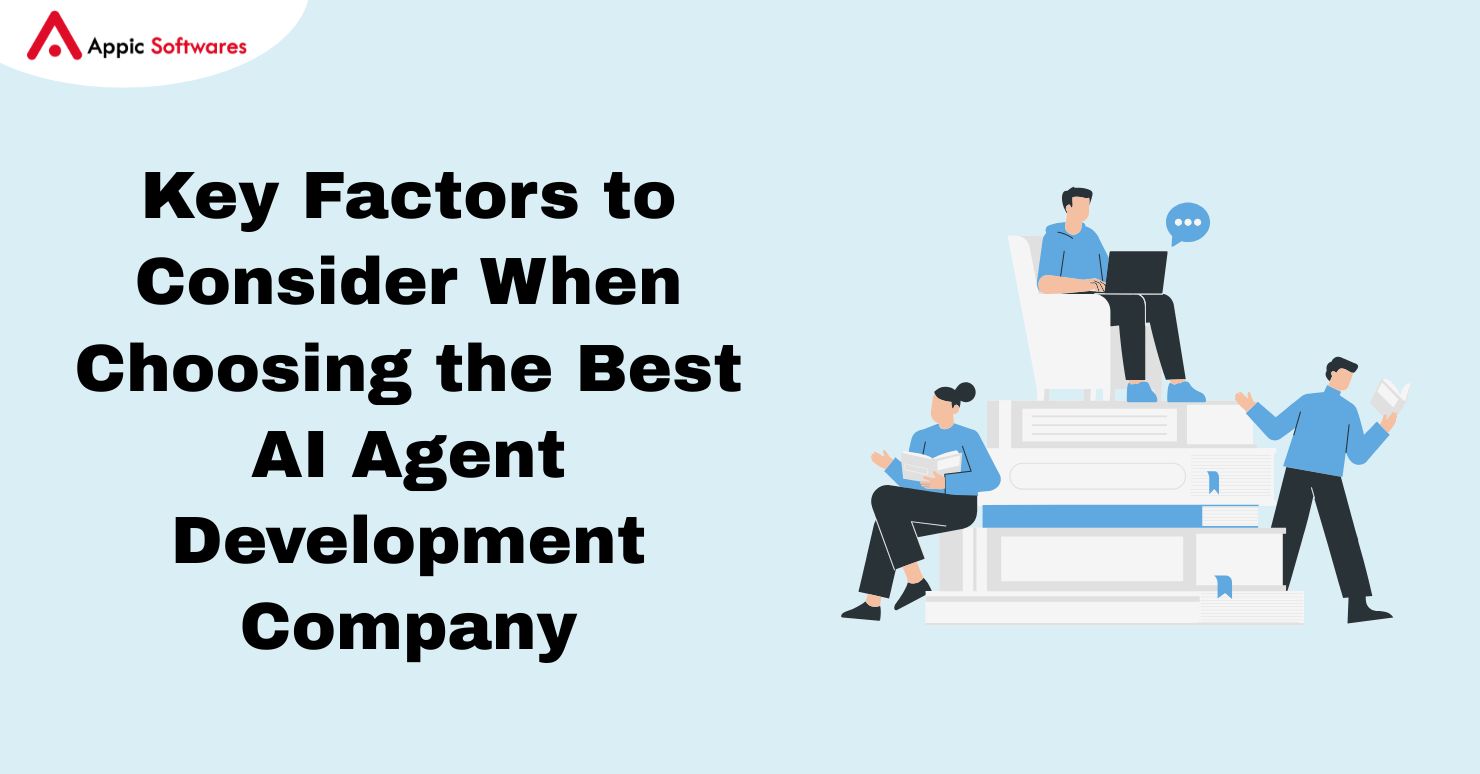
AI is no longer just a word that people use to sound smart. It has become the basis for new ideas in all fields. Businesses are adopting AI bots to handle customer service, make logistics more efficient, boost sales, and even make manufacturing more efficient. These agents are not just bots. They are smart AI agents that can see what’s going on around them, think about it, and do things to reach certain goals.
The question is no more whether to use AI, but how to use it well as more businesses invest in it. Choosing the right AI agent development company is often the key to success. Businesses can create, implement, and scale AI agents that offer measurable value with the appropriate partner. If you work with the incorrect partner, your projects could be late, cost a lot, and not turn out well.
This blog post talks about how organizations can choose the best AI agent development company. It talks about what AI agents are, how they are used, how to evaluate them, how much they cost, and the best ways to make a sensible choice.
Understanding AI Agents
Before evaluating vendors, it is important to understand AI agents themselves.
An AI agent is an autonomous or semi-autonomous system designed to interact with data, tools, or users. It can process information, make decisions, and take actions. These are not static programs. They adapt and improve over time.
Some common AI agents examples include:
-
Virtual agent AI for handling customer service chats and FAQs.
-
AI agents in logistics for optimizing delivery schedules and reducing delays.
-
AI agent for sales that prepares lead summaries and updates CRMs.
-
AI agents for data analysis that generate insights from complex datasets.
-
AI agents for manufacturing that monitor quality control on production lines.
-
Virtual travel booking agent AI that assists travelers with personalized recommendations.
AI agents can also differ in their structure. Businesses must understand the difference between single agent vs multi agent systems:
-
Single agent: Focuses on one role, such as answering customer questions. Simple and cost-effective.
-
Multi-agent: Multiple agents collaborate, each handling part of a task. Useful for complex workflows like supply chain management but costlier to build.
The choice depends on business needs and budget.
Why Choosing the Right Company Matters
The AI landscape is moving fast. According to McKinsey, 71% of organizations use AI in at least one business function. This means your competitors are already experimenting and scaling AI. If your company falls behind, you risk losing market share.
But building AI agents in-house requires expertise in machine learning, data engineering, and deployment. Many companies lack the resources. That is why businesses turn to an artificial intelligence agency.
However, not all vendors are equal. Some over-promise and under-deliver. Others focus only on generic chatbots instead of true intelligent systems. The right partner will understand your industry, work with your data, and design scalable solutions.
Key Factors to Consider When Choosing the Best AI Agent Development Company

Selecting the best AI agent development company requires structured evaluation. Below are the most important factors businesses should consider:
1. Experience and Expertise
Check the company’s past work. Have they built AI agents before? Do they have examples of AI agents in your industry? A firm that has worked on AI agents for customer support or AI agents in logistics will likely understand your business needs better.
2. Use of AI Development Frameworks
Strong companies use proven AI development frameworks. These frameworks provide pre-built components for reasoning, planning, and tool integration. They help reduce errors and speed up deployment. Ask vendors about the frameworks they use and how they ensure reliability.
3. Data Integration Capabilities
An AI agent is only as good as the data it processes. The vendor should be skilled in handling structured and unstructured data, databases, APIs, and Cloud AI services. They must also respect privacy laws and ensure security while accessing sensitive information.
4. Knowledge Based Agent Design
Many tasks require reasoning beyond simple rules. This is where knowledge-based agents come in. They rely on stored facts and inference engines to make logical decisions. A strong vendor should be able to build such agents when your use case requires deeper reasoning.
5. Industry-Specific Understanding
Different industries use AI differently. For instance, AI agents for manufacturing focus on predictive maintenance, while AI agents for sales focus on lead qualification. The best partner understands these differences and adapts solutions to your sector.
6. Security and Compliance
AI systems often handle sensitive information. Ensure that the vendor follows best practices for encryption, access control, and compliance (GDPR, HIPAA, PCI DSS depending on your industry).
7. Scalability and Performance
AI agents must handle increasing workloads. Vendors should demonstrate how their solutions scale with data volume, user load, and task complexity. This is especially critical when using artificial intelligence in mobile apps, where performance impacts user experience directly.
8. Support and Maintenance
AI systems are not “set and forget.” They require continuous updates, retraining, and monitoring. The vendor should offer post-deployment support and performance tracking.
9. Transparent Costs
Budgeting is essential. Vendors should clearly outline the development, deployment, and maintenance costs. Later in this blog, we discuss the cost to develop multi-agents.
10. References and Case Studies
Finally, ask for client references and case studies. A reliable company will showcase success stories, including measurable results like reduced customer support costs or improved sales efficiency.
AI Agents Across Industries
To choose the right company, it helps to know how AI agents are applied in real-world contexts.
AI Agents for Customer Support
These reduce wait times, resolve issues instantly, and escalate complex cases to human agents. They also ensure 24/7 availability. A virtual agent in AI can handle thousands of queries at once, cutting support costs.
AI Agents for Data Analysis
Instead of spending hours on reports, analysts can rely on AI agents. They summarize trends, generate charts, and even explain anomalies. This improves decision-making speed.
AI Agent for Sales
Sales agents help in lead qualification, proposal drafting, and CRM updates. They allow sales teams to focus on building relationships instead of manual data entry.
AI Agents in Logistics
From route optimization to warehouse management, logistics is one of the biggest beneficiaries of AI agents. They minimize delays and reduce fuel costs.
AI Agents for Manufacturing
Manufacturers use AI agents to detect product defects, schedule maintenance, and ensure worker safety. These agents also reduce downtime by predicting machine failures.
Artificial Intelligence in Mobile Apps
Mobile apps are becoming smarter with built-in AI agents. Examples include personal finance apps with spending assistants, or travel apps with virtual travel booking agent AI features.
Cloud AI Services
Cloud-based AI agents allow businesses to scale quickly without investing heavily in hardware. They also provide easier integration with enterprise systems.
Cost to Develop AI Agents
The cost of development depends on multiple factors:
-
Type of agent (single vs multi-agent).
-
Complexity of tasks.
-
Data requirements.
-
Integration with existing systems.
-
Security and compliance needs.
Single agents are cheaper, usually starting from a few thousand dollars. They are suitable for focused use cases such as customer support FAQs.
Multi-agent systems are more expensive. The Cost To Develop Multi Agents can range from tens of thousands to several hundred thousand dollars, depending on scale. These systems are suited for complex workflows like supply chain management or enterprise-wide automation.
Ongoing costs also matter. Businesses must budget for:
-
Model retraining.
-
Infrastructure (especially if using Cloud AI services).
-
Support and monitoring.
The right company will be transparent about all costs.
How to Evaluate an Artificial Intelligence Agency
Here is a simple framework for evaluation:
-
Technical Expertise: Can they explain examples of AI agents they built?
-
Proof of Value: Do they offer pilot projects before scaling?
-
AI Development Framework: Do they use structured frameworks or ad-hoc coding?
-
Security: Can they ensure compliance for your data?
-
Scalability: Do their solutions grow with your business?
-
Cost Transparency: Are estimates clear and realistic?
-
Support: Do they provide continuous updates and maintenance?
This checklist helps businesses avoid vendors who overpromise but lack delivery capacity.
Best Practices for Partnering With an AI Agent Development Company
Choosing a company is the first step. Ensuring long-term success requires collaboration:
-
Start Small: Begin with a pilot project like a virtual agent in AI for customer queries.
-
Set Clear KPIs: Define measurable outcomes such as reduced response times or increased sales conversions.
-
Involve Teams Early: Include your IT, operations, and compliance teams in discussions.
-
Plan for Change Management: Employees need training to work with AI agents.
-
Iterate and Improve: AI agents learn, but they also need fine-tuning. Encourage continuous improvement.
Conclusion
AI agents are becoming necessary for organizations today. They make things work better, save money, and create new chances. But picking the right AI agent development business is the key to success.
A good partner is more than just a seller. They become part of your team. They know your field, respect your data, and offer solutions that can grow with you. The correct organization will make sure that your project brings genuine business value, whether it’s a knowledge-based agent, an AI agent for sales, or a virtual trip booking agent AI.
It’s time to act now that AI is becoming more popular. Carefully look at possible partners, think about costs, and start with a pilot. Companies may protect their operations in the future and go ahead of the competition by doing this.
Are you ready to change your business using AI agents? Don’t just pick a vendor; pick a partner who knows what you want to achieve and makes a significant difference. Start your journey with AI now by doing a trial project. You’ll see how smart agents can help your business expand, become more efficient, and come up with new ideas.
Get in touch with the best AI agent development professionals like Appic Softwares now to protect your business for the future!
FAQs
1. What does an AI agent do in business?
An AI agent is a computer program that can work on its own, learn from data, and make choices to reach certain goals. AI agents are used by businesses for customer service, sales, logistics, data analysis, and even mobile apps. They make decisions faster and cut down on manual tasks.
2. How much does it cost to build an AI agent?
The price of making an AI agent depends on how complicated it is, what characteristics it has, and whether it is a single agent or a multi-agent system. A basic AI agent might cost between $25,000 to $60,000, while more powerful multi-agent solutions with cloud AI services and integrations can cost more than $100,000.
3. How do I pick the best business to make AI agents?
You should check their knowledge of AI development frameworks, knowledge-based agents, and cloud AI services. Find out how long they’ve worked in fields like logistics, manufacturing, or customer service. Get examples and case studies of AI agents. Also, be sure they offer support once the project is done and the capacity to grow your business.


